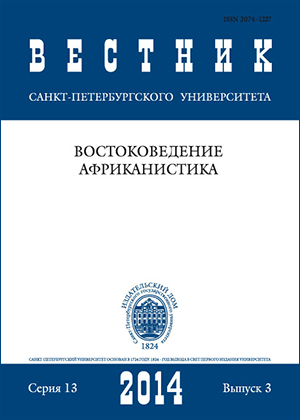Technical aspects of the songs-sermons of Mīrā̃ Bāī: An approach to the study
Abstract
This article deals with the problems arising from the analysis of poetical texts-sermons (bhajan) of Mīrā̃ Bāī (1499–1547), one of the most prominent exponents of the Krishna bhakti cult in Northern India. The task was to find appropriate methods of the literary critical analysis of such texts, which are in many respects similar to Indian folklore songs. The main contemporary practices of the stylistic studies of poetical texts are based on comparison of the stylistic structure of a text with its metrical organization. For Indian medieval quantitative meters of the song poetry we can profit by the ancient Indian approach determining the gaṇa (a measure of four mātrās) as a primary metrical unit which may correlate with the normal metrical foot. This approach helps to reveal rhythmical positions in the line of the text, corresponding to the musical accents of the melody. In this paper we tried to apply this method to the study of one of the bhajans of Mīrā̃ Bāī. The research work revealed that the main syntactical and semantic accents in the poetical line and varied kinds of reiteration, producing intonation dynamics in the line, coincide in the most part with these accented rhythmical positions of the melody (raga Hamīr). In this text syntactical structures of the same type were established along with a set of other syntactical means, of reiterations in varied levels, with the help of which the intonation of the expressions (the lines) and of the text as a whole is formed. Refs 8.
Keywords:
poetical sermon of bhakti cult, poetry of Mīrā̃ Bāī, stylistics of poetical text, phonetic parallelism, syntactical parallelism, lexical parallelism, reiteration, rhythmic-syntactical pattern, intonational accent
Downloads
References
Downloads
Published
How to Cite
Issue
Section
License
Articles of "Vestnik of Saint Petersburg University. Asian and African Studies" are open access distributed under the terms of the License Agreement with Saint Petersburg State University, which permits to the authors unrestricted distribution and self-archiving free of charge.





